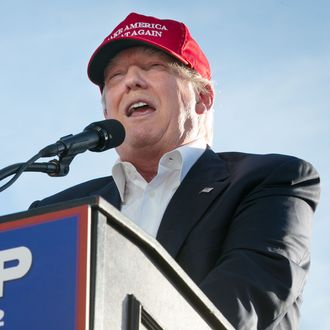
A full year after launching his campaign — with the Republican nomination in tow and Election Day just five months away — Donald Trump is still treating his presidential bid like a publicity stunt for his businesses. On Wednesday, the tycoon announced that he would travel to Scotland on June 24, the day after the United Kingdom casts its vote on Brexit. But this timing is purely coincidental. Trump’s trip isn’t an attempt to advertise his diplomatic skills. Rather, on a day that could transform the political and economic life of a core U.S. ally, the GOP nominee will be presiding over the grand reopening of the Trump Turnberry golf resort.
This is par for the candidate’s course. Throughout his campaign, Trump has treated moments of great public significance as opportunities to promote his private enterprises. Most famously, after winning the Michigan and Mississippi primaries, he fashioned a victory speech into a QVC special for his long-defunct steak, water, and magazine companies.
Such behavior — combined with the fact that he has no plans to divest himself from his myriad businesses upon entering the Oval Office — has prompted suspicions that Trump might use the powers of the presidency for personal gain. But there’s no longer any need for mere suspicion: Over the past seven days, Trump has essentially promised to abuse his executive authority to advance his own financial interests.
At a rally in San Diego last week, the mogul launched a personal, racist attack against the federal judge overseeing two class-action lawsuits against Trump University. The GOP nominee called Judge Gonzalo Curiel “a hater of Donald Trump” — a claim he supported by noting that Curiel is a “Mexican” (the judge was born in Indiana).
And then the standard-bearer of one of our major political parties argued that the judge overseeing a civil case against his fraudulent university should be investigated for corruption.
“They ought to look into Judge Curiel, because what Judge Curiel is doing is a total disgrace,” Trump said. “But we will come back in November. Wouldn’t that be wild if I am president and come back and do a civil case?”
Trump’s attack was a reaction to Curiel’s decision to publicly release materials from the lawsuits against him. Those materials sparked so much righteous outrage, the press had little time to dwell on the obscenity of the attack itself: Backed into a corner, Trump had discarded the fig leaf concealing the plain racism of his anti-immigration demagoguery. Previously, the candidate had insisted that his rants against “Mexican rapists” referred strictly to the undocumented population — he had nothing but appreciation for Hispanic American citizens. And those “legal” Latinos loved him back!
But Trump is not under the impression that Curiel is both an undocumented immigrant and a federal judge. Rather, the GOP nominee suggested that Curiel’s Hispanic heritage makes him an illegitimate arbiter of his civil case — a claim that only makes sense if there’s something inherently suspect about “Mexican” Americans and/or that “Mexican” Americans are inherently predisposed to dislike Donald Trump.
Beyond their naked racism, the remarks suggest that, at the very least, Trump would gladly use the president’s bully pulpit to intimidate judges who rule against his enterprises. And on Tuesday night, he suggested that he would exercise the same prerogative against golf organizations that defy his will.
Speaking about the tragedy of off-shoring with Sean Hannity, Trump promised, “I’m going to bring jobs back from Mexico and China and all these places.” He then shared an example of the kind of jobs he’d like to recover.
“I mean, I just heard that the PGA tour is taking their tournament out of Miami and moving it to Mexico,” Trump lamented. “They use one of my places. They’re moving their tournament … And I’m saying, you know, what’s going on here? It is so sad when you look at what’s going on with our country.”
Here, Trump suggests that the Professional Golf Association’s refusal to frequent his establishment is an affront to the American worker. Which is to say, he uses his status as a presidential nominee to impose political costs on a business partner that upset him.
Such shameless huckerstism is almost comical — until one remembers how close this shameless huckster is to commanding a global superpower.






























